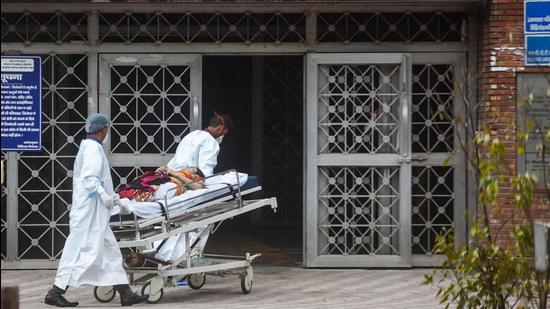Immune cells fail to communicate, cause cytokine storm in Covid patients: Study
Cytokine storm is an overreaction of the immune system and involves overproduction of cytokines. The findings of the team were published in the August 6 edition of The Journal of Immunology, a peer-reviewed journal published by The American Association of Immunologists
Immune cells fail to communicate and often result in a fatal cytokine storm due to a drop in a particular protein level in Covid-19 patients, a team of researchers from India and the US has found. Cytokine storm is an overreaction of the immune system and involves overproduction of cytokines.

“Quorum sensing or communication between bacterial cells is well known. But in our research, we showed that such quorum sensing also takes place between macrophages (white blood cells that eat bacteria and dying cells) and this interaction takes place with the help of a protein called gelsolin,” said Partho Sarothi Ray, who led the team, and is in the US for research work.
The National Investigation Agency (NIA) has summoned Ray, an associate professor at Kolkata’s Indian Institute of Science Education and Research (IISER), more than once in connection with its probe into violence in Maharashtra’s Bhima Koregaon in 2018. “I once worked closely with (activist and Jesuit priest) Stan Swamy. Many persons have already been arrested and I am not sure what would happen in the future. I have already been summoned for questioning as a witness in the Bhima Koregaon case since 2020. I told the NIA that I am ready to face their questions via video conferencing.”
Swamy, who worked for tribal rights in Jharkhand for five decades, was arrested under an anti-terror law in October 2020. He spent over eight months in jail awaiting trial before he died in a Mumbai hospital in July.
Swamy, 84, was the oldest of 16 activists and lawyers arrested on charges of conspiring to foment violence at Bhima Koregaon, which was rocked by caste clashes during the bicentennial celebration of a British-era war by Dalits. The priest was accused of having Maoist connections and working for their frontal organisations.
NIA sleuths have visited the IISER campus looking for Ray. “He has not come to the institute for almost a year now. We do not know where he is. His (Indian) number is switched off,” said an IISER faculty member, requesting anonymity.
Ray was arrested in 2012 and released 10 days later after he took part in a protest against an eviction drive in a slum. West Bengal chief minister Mamata Banerjee then claimed Maoists were behind the protests.
Also Read | Bengal chief minister Mamata Banerjee invited to attend peace conference in Rome
An NIA official said Ray has been summoned as a witness. “The investigating officer has been in touch with him for the past one year. He is presently in the US for training. He said that he cannot come to India and appear for questioning citing Covid-19,” said the official, requesting anonymity.
The findings of the Ray-led team, meanwhile, were published in the August 6 edition of The Journal of Immunology, a peer-reviewed journal published by The American Association of Immunologists.
“While putting up the body’s first line of defence, the macrophage cells ‘talk’ to each other to assess their own potential and keep on releasing cytokine. But in a Covid-19 patient’s body, the communication between macrophages fails because there is a drop in the protein gelsolin. As the macrophages can’t communicate, they keep on releasing cytokine which ultimately results in the cytokine storm,” said Ray.
Ray said their research also shows that the fall in gelsolin is triggered because of an enhancement of miR-21 RNA. “Clinical trials have already started even before the research was published,” he said. He added the research was carried out on macrophage cells of rats.
Ray’s team of researchers included Reshma Kumari Sharma, Binita Goswami, Sukhen Das Mandal and Abhishek Guha (IISER), and Belinda Willard (Cleveland Clinic).
Experts have called the findings of Ray and his team landmark and said they can be applied for treating not just Covid-19 but particularly inflammatory diseases.
“This research has got some implications in the wide array of other diseases besides Covid-19. The outcome may be exploited in several inflammatory diseases viz auto-immune diseases such as rheumatoid arthritis, systemic lupus erythematosus, and inflammatory bowel syndrome, Alzheimer’s disease, gout, and infectious diseases such as influenza, dengue etc. Potential therapeutic applications are expected from this basic immunobiology research that made the work interesting,” said SN Joardar, professor, veterinary microbiology at West Bengal University of Animal and Fishery Sciences.
“This research paper shows that if there is a fall in gelsolin level, the cytokine storm erupts and that if gelsolin can be supplied to the patient, the cytokine storm may be stopped. But like gelsolin, there are several other compounds which macrophage cells need to communicate among themselves. In the past, research has been done on some other compounds by other scientists who used rat cells. Human trial is yet to be done,” said Pratip Kundu, former head of the School of Tropical Medicine in Kolkata.





